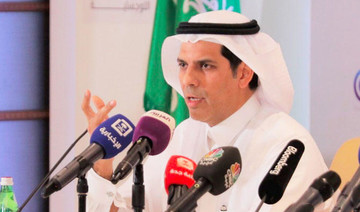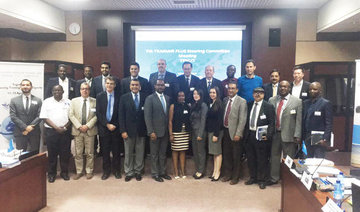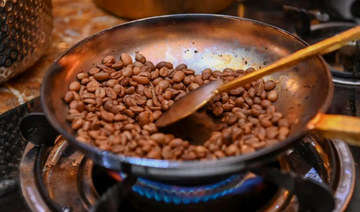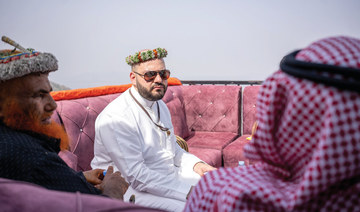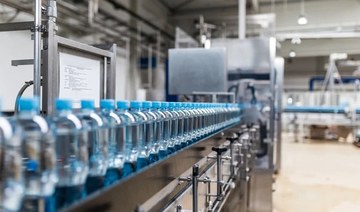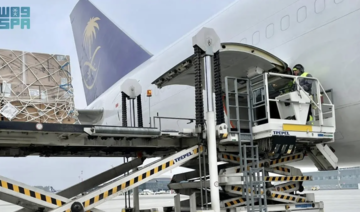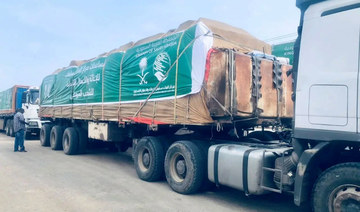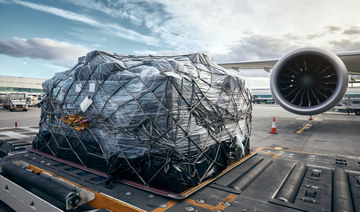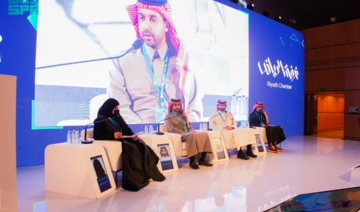RIYADH: The General Authority of Civil Aviation (GACA) hosted the opening of the 2019 Global Aviation Summit (GAS), a two-day international forum, at the Ritz-Carlton hotel in Riyadh on Monday.
In his opening address, Saudi Minister of Transport Dr. Nabeel Al-Amoudi discussed the value of the industry to the Kingdom, stating that civil aviation generated an estimated $126 billion annually, as well as providing 527,000 jobs.
He also discussed the recent accidents involving two Boeing 737 MAX aircraft, saying there were no immediate plans to allow the model to operate in Saudi airspace. “There were no 737 MAX aircraft flying in the Kingdom at the time,” he said, “and there aren’t plans for them to fly again in the near future.” Boeing’s top-selling MAX jet was grounded globally last month after two fatal crashes in Indonesia and Ethiopia.
Boeing’s senior managing director for commercial marketing, Darren Hulst, gave a keynote address where he discussed the Kingdom’s peculiarly opportune position in the global aviation industry.
“Saudi Arabia is unique, both as a strategic location and a destination, through pilgrimage and the Hajj and Umrah sector, and growing tourism opportunities,” he said.
“There is also the whole economic industry that comes along with aviation. Boeing has been a part of building that industry he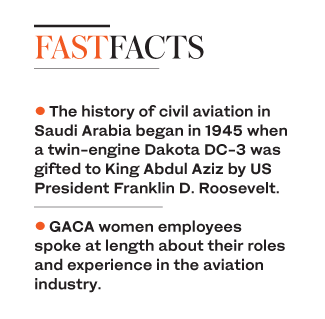 re in the last few decades, with various partnerships and joint ventures, and we are continuing to accelerate those investments.”
re in the last few decades, with various partnerships and joint ventures, and we are continuing to accelerate those investments.”
The history of civil aviation in Saudi Arabia effectively began in 1945, when a twin-engine Dakota DC-3 was gifted to King Abdul Aziz by US President Franklin D. Roosevelt. It was the first aircraft to land in the Kingdom, and it marked the beginning of Boeing’s relationship with the country.
“When we think about where we are today and where we can be as an industry in the next decade, the opportunities are limitless,” Hulst continued. “When you take into consideration the number of airplanes to support, the number of people to train, and the value of goods and services produced, we think this country has a unique advantage. In general, aviation growth has always doubled in relation to economic growth. Here in Saudi Arabia, though, because of all of its advantages, we see a fourfold multiplier effect. Boeing looks forward to being a part of it.”
The GACA’s media spokesman, Ibrahim Al-Rosa, said: “We are hosting over 150 high-profile individuals, including the heads of the world’s largest aviation companies. The GACA has long believed in the importance of this industry, its development and progress, which includes investment opportunities and the ushering in of a promising young generation of men and women.”
Female GACA employees also spoke at length about their roles and experience in the aviation industry. At the “Women in Aviation” panel discussion, Haifa Hamedaldean, transformation project manager for the Saudi Air Navigation Services (SANS), discussed the roles women now hold in aviation.
“I’m delighted to represent SANS as a vehicle for female empowerment in the aviation industry,” Hamedaldean said. “SANS not only attracts women in administrative roles, but also in operational ones. In little over a year, SANS has grown the number of women employed from zero to 38. You’ll find them in strategy, management, engineering and information technology. You’ll see them in human resources, in training and recruitment. Eleven of our women serve as air-traffic controllers and we are expecting 15 more to join us by the end of this year.”
As Saudi Arabia continues to diversify its economy, the civil aviation industry represents a key pillar in that change, given the country’s location as a global logistical hub. Investment deals proposed at the GAS could see thousands of jobs created, and would raise the Kingdom’s global ranking in the Logistics Performance Index from 49 to 25. Direct foreign investment, currently at 3.8 percent, would rise to 5.7 percent of the gross domestic product. At the GAS, a memorandum of understanding was signed between the Kingdom and Argentina on air transport cooperation, while agreements were also signed with Georgia and Chad, in addition to an air service agreement between the GACA and the Cypriot government.
2019 Global Aviation Summit opens in Riyadh
2019 Global Aviation Summit opens in Riyadh
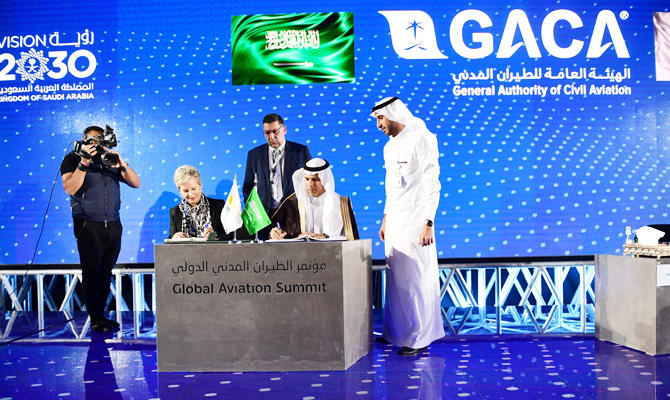
- Civil aviation sector in the Kingdom generates an estimated $126 billion in revenues annually
- Investment deals proposed at the GAS could see thousands of jobs created, and would raise the Kingdom’s global ranking in the Logistics Performance Index from 49 to 25
How the hospitality industry in Saudi Arabia is embracing environmental sustainability
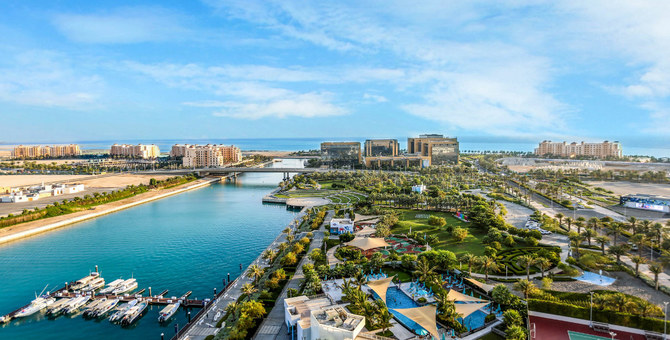
- From the Red Sea coast to Al-Ahsa Oasis, new eco-friendly hotels and resorts are opening across the Kingdom
- Industry leaders are boosting sustainability by cutting emissions, protecting habitats, and creating jobs locally
RIYADH: Saudi Arabia is emerging as a hotspot for international investment. Its latest hook? Sustainable hospitality.
The Kingdom led the Middle East and Africa’s hotel-building activity in 2023, with 42,033 hotel rooms constructed. This accounted for 35.1 percent of the 119,505 built in the region over the year, according to data from hotel monitoring firm STR.
Saudi Arabia’s hotel segment is projected to generate $2.51 billion in revenue this year and is expected to reach $3.02 billion by 2027, according to Statista.
One of the Kingdom’s Vision 2030 goals is to champion sustainability across all sectors, and in turn, hotels and plazas across the country have been working to implement more environmental and eco-friendly practices in their facilities.
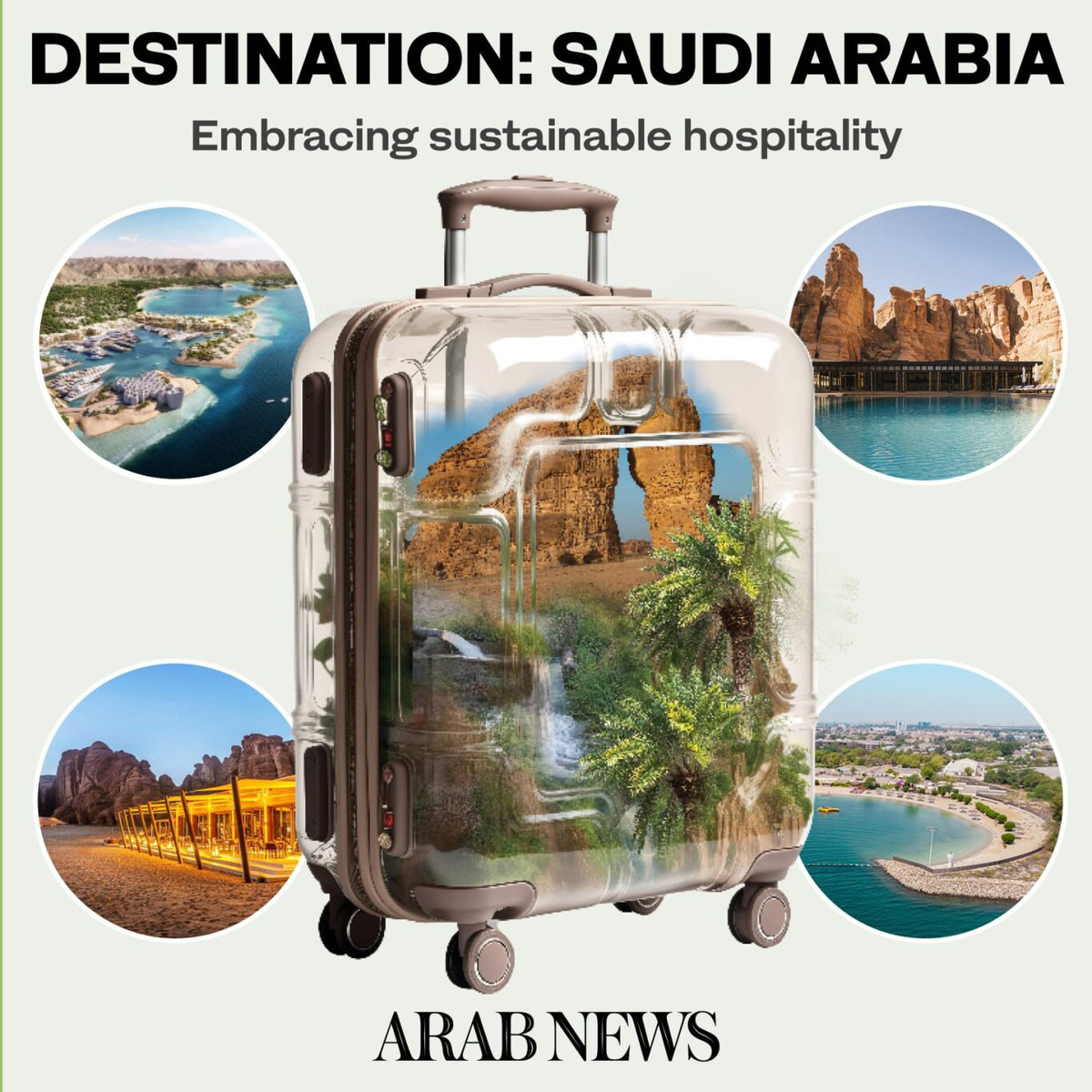
From 2010 to 2019, Saudi Arabia’s tourism industry has contributed an average of 6.4 percent to the country’s gross domestic product, while recording a decline in greenhouse gas emissions.
In contrast, the global GDP average for travel and tourism over the same period rose 4.3 percent, and emissions by 2.5 percent.
Several of Red Sea Global’s developments are already up and running along the Kingdom’s northwestern coastline, including the Six Senses Southern Dunes, The Red Sea and St. Regis Red Sea Resort.
The company recently announced further projects pillared by environmental sustainability.
The Four Seasons luxury wellness resort, Amaala, Triple Bay, is branded with regeneration and wellness at its core, and is set to feature a one-of-a-kind Corallium marine life institute.
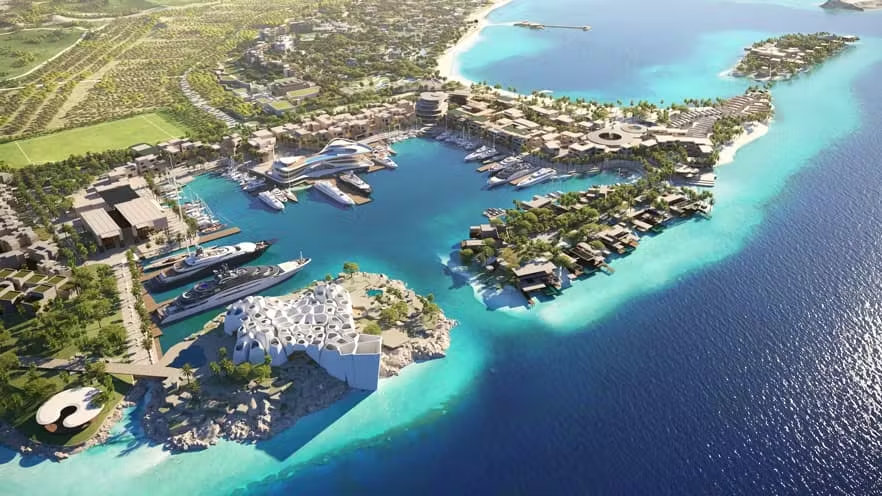
Progress is also being made on a sustainability-focused staff village that will provide housing for those who work at the resort. RSG says that five international operator brands, including Six Senses and Clinique La Prairie, are expected to be confirmed in the coming months.
“Our mission to develop new destinations as beacons of responsible tourism, showcasing the best in sustainable and regenerative development, gains unprecedented urgency as our planet continues to face challenges in relation to the climate crisis and biodiversity loss,” John Pagano, RSG’s group CEO, said in a statement.
The economic zone NEOM recently unveiled three new sustainable hotels in its Leyja oasis, including three flagship Habitas properties, as well as Zardun, a sanctuary resort designed to harmonize with the surrounding ecosystem.
NEOM’s Hotel Development division has also sponsored Hotelschool The Hague to bring about the Sustainable Hospitality Challenge, bolstering a new generation of innovation in the industry.
Many of the resorts across Saudi Arabia are built to blend in with the surrounding environment. Take AlUla’s Habitas, for example, which boasts the city’s serene desert landscape that immerses guests in its untouched backdrop.
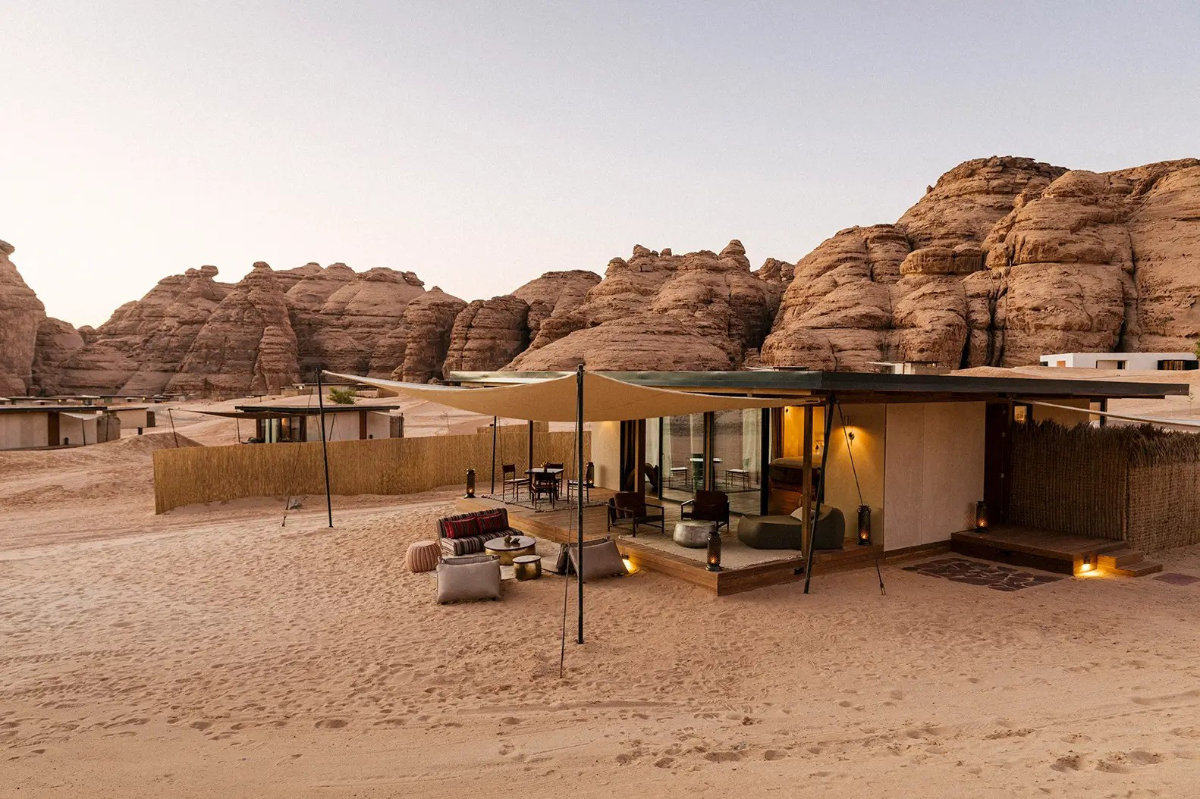
The luxury resort brand demonstrates its sustainable ethos, in line with the UN Sustainable Development Goals for 2030, through the offsetting of carbon emissions, waste management and a single-use plastic free policy.
“The AlUla Sustainability Charter is at the core of every hospitality project we develop within the destination,” Phillip Jones, chief tourism officer at the Royal Commission for AlUla, told Arab News.
“From the foundational design and materials of construction to the infrastructure, and the ongoing operations, as we only work with international operators that have a proven track record in sustainability, AlUla’s hotels and resorts each contribute toward delivering on our goals, such as achieving net carbon neutrality for local emissions by 2035.”
As the Arab region demonstrates overall lower environmental sustainability due to water scarcity, harsh climate and biodiversity threats, industry leaders are redefining the buzz term to fit local standards.
There are a number of grassroots projects that examine the existing traces of environmental sustainability awareness throughout the Arab region’s history. The Kingdom’s forefathers exhibited community-centered lifestyles, for example, while Islam advises its followers to conserve food and water consumption.
Chris Nader, CEO and co-founder of luxury ecolodge brand and management company ENVI Lodges, told Arab News: “Sustainability comes from a basis of trying to minimize our negative impacts on the environment. It’s not only nature, or animals — it’s also people.”
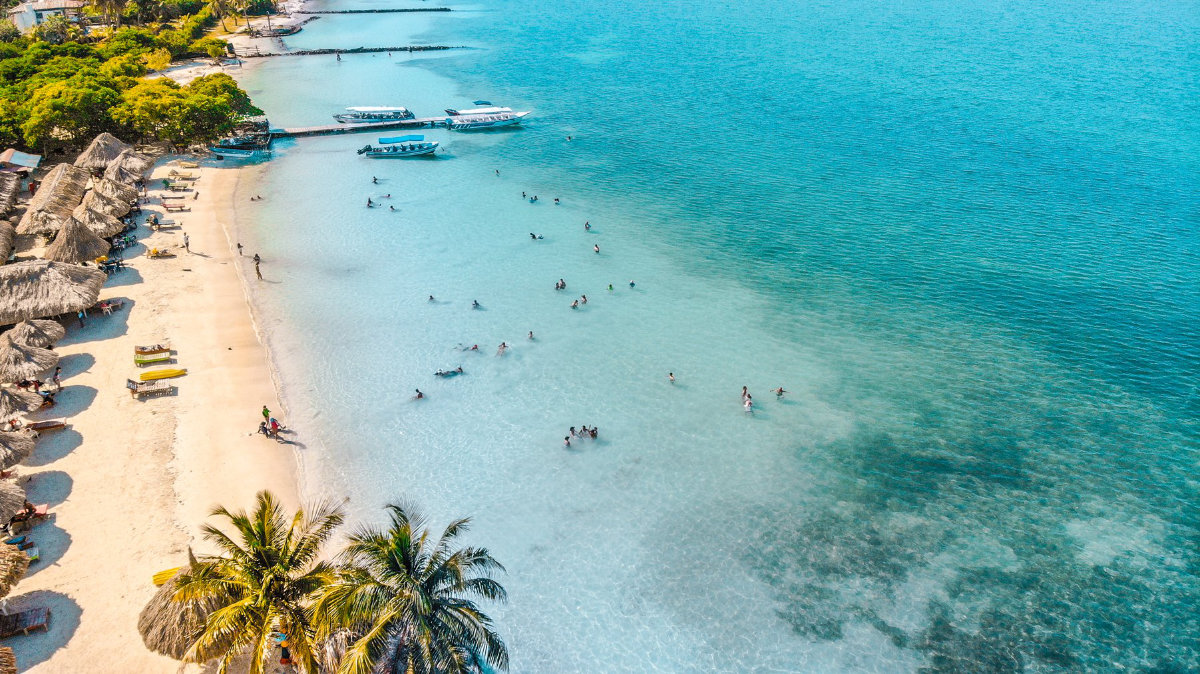
ENVI Laguna Bay, a sustainable project developed by Al-Rasim Hotels and Resorts, will occupy a prime Red Sea coast beachfront destination in King Abdullah Economic City, surrounded by mangroves.
“KAEC will host the first eco-friendly coastal resort in the distinguished and captivating laguna area,” Aiad Mushaikh, CEO of Al-Rasim Hotels and Resorts, said in a statement.
The project strongly aligns with Saudi Arabia’s Vision 2030. Its road map for tourism sector growth includes respecting the land, protecting wildlife, supporting local communities, sourcing mindfully, in-house food production, engaging guests and designing a sense of place. These pillars have been built into the technical guidelines of building the lodge.
One common belief is that building necessitates the destruction of land. But through its design principles, ENVI demonstrates different approaches that can be taken to minimize its presence within the natural landscape. The company builds low-impact lodges that blend into the environment.
“We don’t do excavations,” said Nader. “We put our unit on stilts or decks, and we don’t build the units completely on the site so the amount of people and trucks on the site that have to come and go is very limited.”
An important element is also selecting materials from the environment, whether they be wood, rocks or mud, and sourcing materials and products that will maintain durability and integrity over time.
Opinion
This section contains relevant reference points, placed in (Opinion field)
The company also champions sourcing a percentage of the ingredients used in its kitchens from in-house gardens, developing programs for wildlife protection and hiring staff from local communities, all of which are tailor-made programs for each lodge.
The whole concept is to assume the project is temporary, aiming to leave the landscape more or less in the same state it was found in. The walkways are not poured concrete, and the native species are planted to cross-pollinate.
Another way to stitch sustainable practices within the fabric of the community is to engage guests in the initiative.
“Today, guests don’t want to be spectators,” said Nader. “They don’t want to be told that the lodge is planting mangroves. They want to plant themselves. Guests want to clean the beach, or the lodges, to remove any litter and plastic and all of that. They want to be involved in saving wildlife and caring.”
Saudi Arabia’s Public Investment Fund recently launched Dan Company, which specializes in agritourism and ecotourism. Architecture and design practice LWK + Partners is working on a project with Dan Co. that aims to invigorate the agriculture industry in Al-Ahsa through hospitality, serving as a benchmark for future projects.
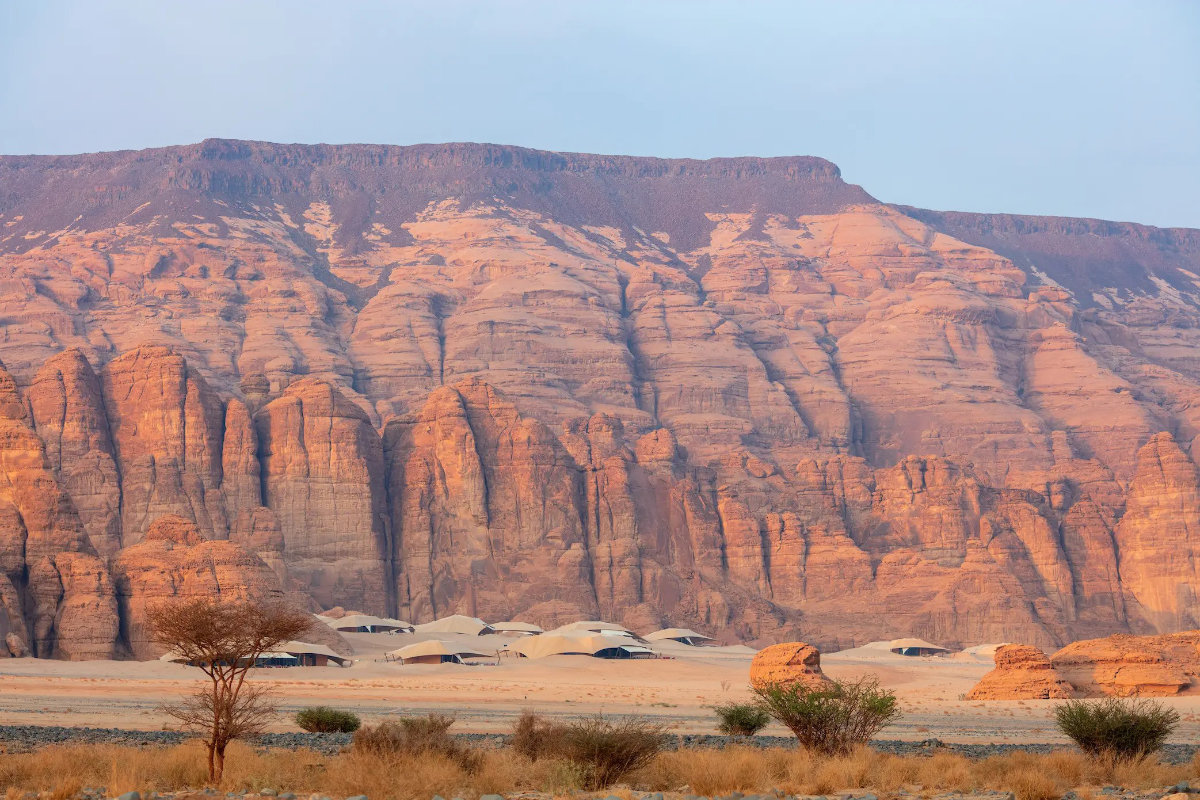
Kerem Cengiz, MENA managing director at LWK + Partners, told Arab News: “Sustainability isn’t just about the reduction of energy; sustainability is also about the way we create places that are harmoniously designed to make the way we interact with them sustainable.
“We look at sustainability as a holistic offering, rather than a series of tick boxes that we need to achieve.
“It really is important that when we design, we don’t have a pattern book; it still saddens me that we’ve seen many buildings going up that are just glass towers. They express a certain language and vision, but are they desirable in the context of the challenges that we’re facing environmentally?”
He added that the key to bridging these sustainable values into the future of the industry is to focus on a fundamental understanding of technology and innovation. How do you put in sensors that turn off the AC when guests leave the room, for example?
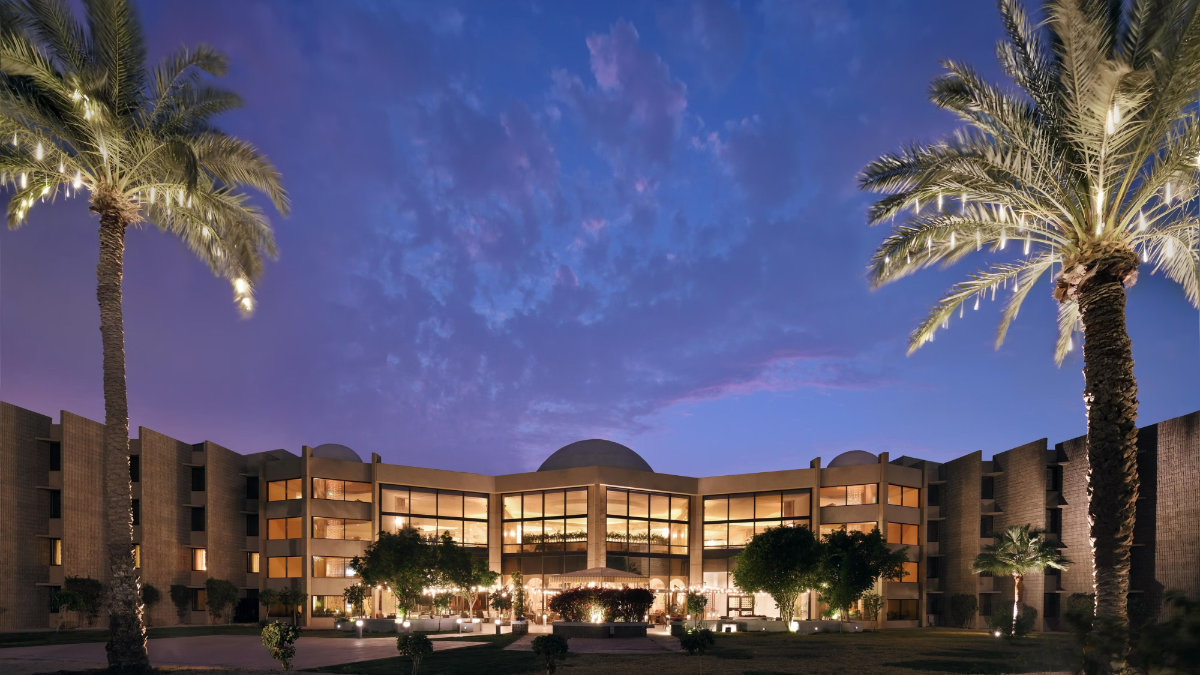
Saudi Arabia is leading the way in many development practices, said Cengiz. The Holiday Inn Tabuk is utilizing solar energy as an alternative power source in some locations, while the InterContinental Jubail carries out voluntary campaigns to clean its beaches.
Like Nader, Cengiz said that private and public developers should move towards sourcing materials that are locally or regionally available. This adds great value not only economically, but also sustainably, by cutting down on products imported from overseas, simultaneously reducing carbon emissions.
He added: “Now, Saudi is developing its own market and its own product lines. I think that, in itself, has a massive impact and I would love to see more attention on that type of thing.
“I think we’re way past the 2030 Vision now. I mean, we’re evolving it much further into something significantly more impactful.”
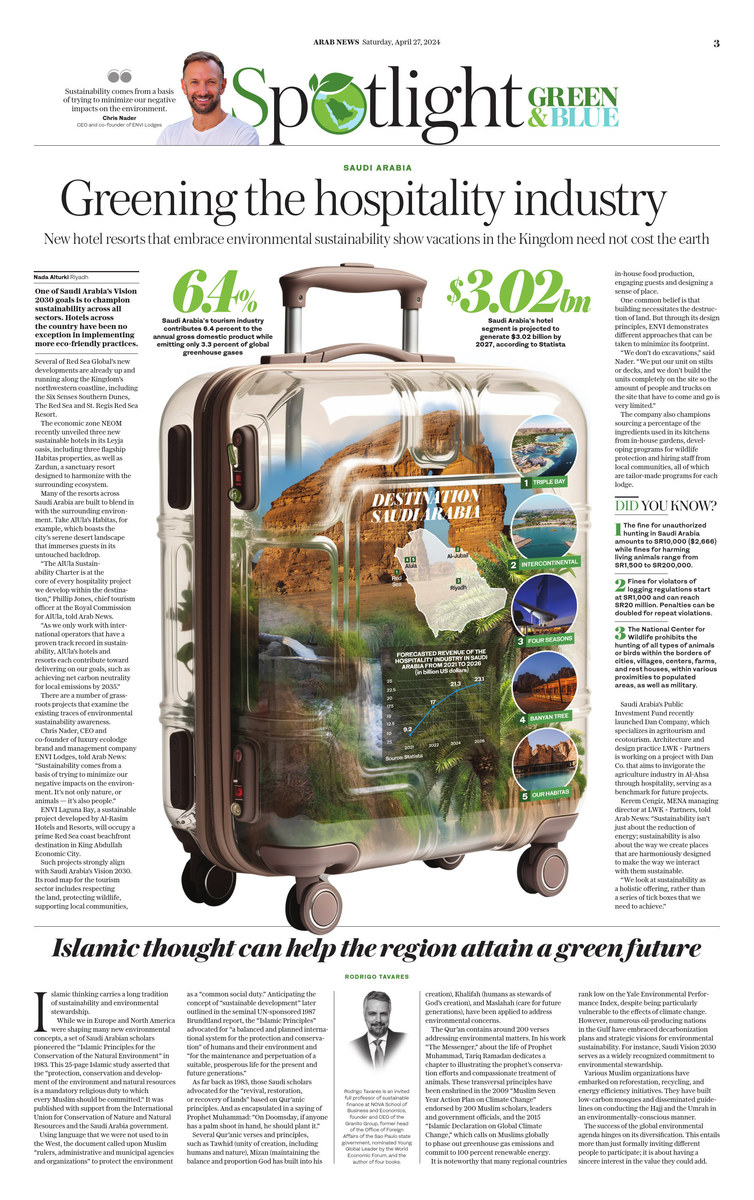
Saudi Coffee Co. and Bieder & Maier blend two coffee cultures
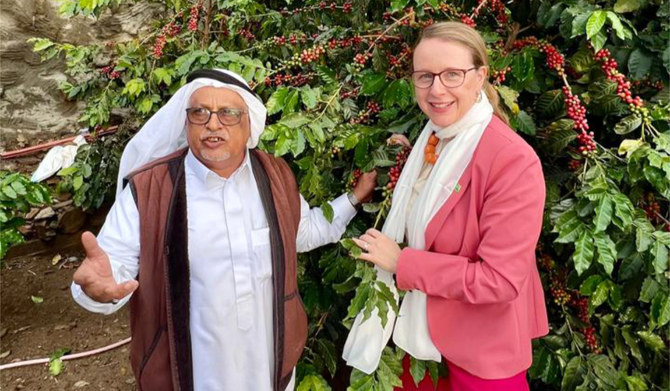
- Viennese coffee-maker collaborates with local brand to buy Arabica beans from Jazan
RIYADH: The Kingdom and Austria recently celebrated the world premiere of the “Premium Saudi Blend” by Viennese coffee manufacturer Bieder & Maier and the Saudi Coffee Company.
The launch of the product brings Saudi and Austrian coffee culture together. During the presentations in Vienna and Riyadh, guests tasted the new coffee roast, catering for espresso to filter and cold brewing.

“The coffee is an embodiment of our culture and identity,” CEO of Saudi Coffee Company Khalid AbuTheeb told Arab News. “With the objective of enhancing the local coffee industry and promoting our coffee tradition, we have collaborated with Bieder & Maier, a Vienna-based coffee powerhouse.”
AbuTheeb said that the collaboration was facilitated by the Saudi Ministry of Investment. “Through this collaboration ... the Saudi Coffee Company will bring forth unique coffee blends utilizing Saudi coffee beans in a mix with international beans to the Saudi and Austrian markets,” he said.
HIGHLIGHTS
• In 2011, Viennese coffee house culture was declared an intangible world heritage, followed by Arabic coffee in 2015 and Saudi Khawlani Arabica beans in 2022.
• They have all been declared intangible world heritage by UNESCO in recognition of their respective traditions and cultural significance.
• Starting during fall this year, a number of coffee houses will be opened in Saudi Arabia, with Cenomi Retail as franchise partner.
According to AbuTheeb, they will supply the finest Saudi coffee beans directly from the Jazan region.
“As we explore roasting capabilities here in the Kingdom, we are not just content with embracing tradition; we are striving to shape the future of coffee, where innovation intersects with heritage on a global scale,” he said.
Dr. Margarete Schramboeck, the former minister of economy and digital affairs of Austria, and current Aramco digital board member, expressed her growing interest in Saudi coffee culture since she moved to the Kingdom.
“It was the year 2022 when I first came to the Kingdom and learned about the Year of Saudi coffee and the amazing culture of growing coffee in Jazan,” Schramboeck told Arab News. “Therefore, I was passionate about bringing this idea of a special Saudi blend to life. An exceptional partnership with the support of the Ministry of Investment of Saudi Arabia has been initiated. I want to thank Minister Khalid Al-Falih and team for the support.”
Recalling her visit to Jazan and its coffee-growing families, Schramboeck said: “The quality and tradition of coffee has deeply impressed me.”
Rudi Kobza, founder and CEO of Bieder & Maier Vienna, stressed the importance of the collaboration. “The Saudi heritage is unique and the ambition of the Saudi Coffee Company is impressive. The Premium Saudi Blend brings this philosophy in an authentical way alive. This can be experienced soon in our first Bieder & Maier cafe in Saudi Arabia, which we will operate with our partner Cenomi, as well as in Vienna.”
“Austrians share a common passion for coffee. Therefore, I was passionate about developing this project. When Saudi Arabia meets Vienna, the home of the Arabica coffee bean combines with the home of traditional coffee house culture to create a particularly enjoyable coffee project.”
In 2011, Viennese coffee house culture was declared an intangible world heritage, followed by Arabic coffee in 2015 and Saudi Khawlani Arabica beans in 2022. They have all been declared intangible world heritage by UNESCO in recognition of their respective traditions and cultural significance.
Starting during fall this year, a number of coffee houses will be opened in Saudi Arabia, with Cenomi Retail as franchise partner.
Excavators held for violating water system
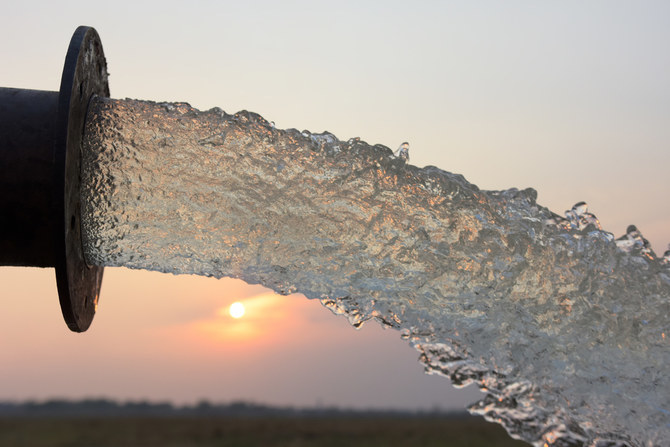
- The discovery was made during field tours carried out by the water department
TUBARJAL: The Al-Jouf branch of the Saudi Ministry of Environment, Water and Agriculture has apprehended three excavators who were found to be violating the water system in Tubarjal.
The discovery was made during field tours carried out by the water department, in cooperation with the competent authorities in the governorate.
Separately, authorities in Addayer in the Jazan region have arrested seven Ethiopians for smuggling 105 kg of hashish. Legal procedures have been completed against the offenders who were handed over, along with the seized items, to the competent authority.
Border guard patrols in the Al-Harth area of Jazan have also foiled an attempt to smuggle 71 kg of hashish, with initial legal procedures completed and the find handed over to the competent authority.
Security authorities have reiterated their appeal for citizens and residents to report any information regarding drug smuggling or selling by calling 911 in Makkah, Riyadh, and the Eastern Region, and 999 in the rest of the Kingdom’s regions.
Those with information may also contact the General Directorate of Narcotics Control at 995 or at [email protected].
48th Saudi relief plane for Palestinians
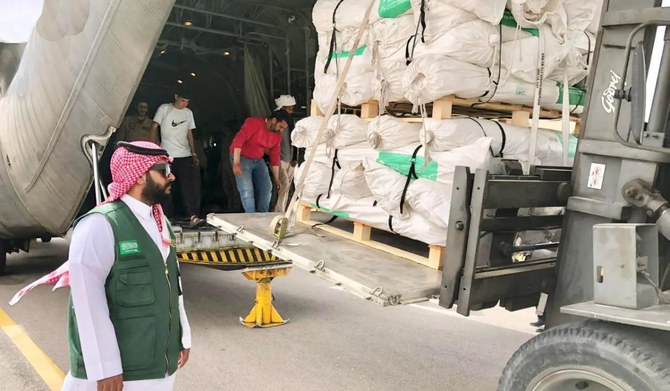
- The plane carried shelter materials to be transported to the conflict-affected Palestinians in the Gaza Strip
AL-ARISH: The 48th Saudi relief plane for Palestinians in Gaza arrived on Friday at Al-Arish International Airport, Egypt.
It was operated by the King Salman Humanitarian Aid and Relief Center, in coordination with the Saudi Ministry of Defense.
The plane carried shelter materials to be transported to the conflict-affected Palestinians in the Gaza Strip.
The provision of aid is ongoing from the Kingdom, which has stood firm with the Palestinians amid crises and tribulations.
Direct KSA to Iraq flight routes announced
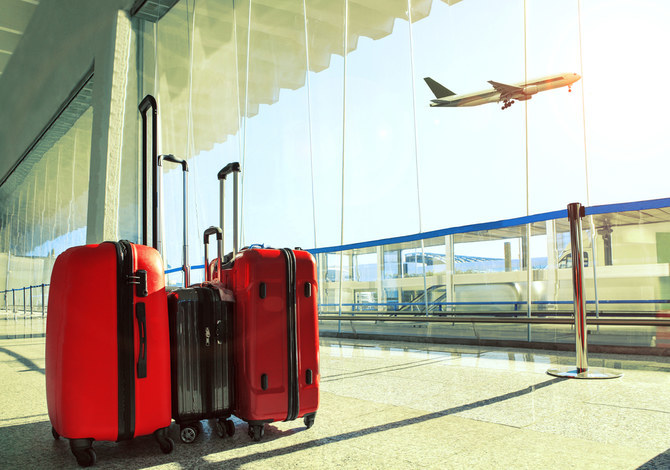
- These flights, along with flights to Baghdad and Irbil, will commence from June 1.
RIYADH: The Saudi General Authority of Civil Aviation announced the launch of direct flights from Dammam to Najaf, the Saudi Press Agency reported on Friday.
The decision is in line with the Kingdom’s national aviation sector strategy, aimed at doubling capacity to accommodate over 330 million passengers annually, and extending services to more than 250 global destinations.
These flights, along with flights to Baghdad and Irbil, will commence from June 1.



